- Home
- Martin Amis
The Pregnant Widow
The Pregnant Widow Read online
ALSO BY MARTIN AMIS
FICTION
The Rachel Papers
Dead Babies
Success
Other People
Money
Einstein’s Monsters
London Fields
Time’s Arrow
The Information
Night Train
Heavy Water and Other Stories
Yellow Dog
House of Meetings
NONFICTION
Invasion of the Space Invaders
The Moronic Inferno
Visiting Mrs. Nabokov
Experience
The War Against Cliché
Koba the Dread
The Second Plane
To IF
The death of the contemporary forms of social order ought to gladden rather than trouble the soul. Yet what is frightening is that the departing world leaves behind it, not an heir, but a pregnant widow. Between the death of the one and the birth of the other, much water will flow by, a long night of chaos and desolation will pass.
ALEXANDER HERZEN
narcissism: n. excessive or erotic interest in oneself and one’s physical appearance.
Concise Oxford Dictionary
Now I am ready to tell how bodies are changed Into different bodies.
The Metamorphoses
(TED HUGHES, Tales from Ovid)
2006
Introductory
They had driven into town from the castle; and Keith Nearing walked the streets of Montale, Italy, from car to bar, at dusk, flanked by two twenty-year-old blondes, Lily and Scheherazade …
This is the story of a sexual trauma. He wasn’t at a tender age when it happened to him. He was by any definition an adult; and he consented—he comprehensively consented. Is trauma, then, really the word we want (from Gk “wound”)? Because his wound, when it came—it didn’t hurt a bit. It was the sensory opposite of torture. She loomed up on him unclothed and unarmed, with her pincers of bliss—her lips, her fingertips. Torture: from L. torquere “to twist.” It was the opposite of torture, yet it twisted. It ruined him for twenty-five years.
When he was young, people who were stupid, or crazy, were called stupid, or crazy. But now (now he was old) the stupid and the crazy were given special names for what ailed them. And Keith wanted one. He was stupid and crazy too, and he wanted one—a special name for what ailed him.
He noticed that even the kids’ stuff got special names. And he read about their supposed neuroses and phantom handicaps with the leer of an experienced and by now pretty cynical parent. I recognise that one, he would say to himself: otherwise known as Little Shit Syndrome. And I also recognise that one: otherwise known as Lazy Bastard Disorder. These disorders and syndromes, he was pretty sure, were just excuses for mothers and fathers to dope their children. In America, which was the future, broadly speaking, most household pets (about sixty per cent) were on mood drugs.
Thinking back, Keith supposed that it would have been nice, ten or twelve years ago, to drug Nat and Gus—as a way of imposing ceasefires in their fratricidal war. And it would be nice, now, to drug Isabel and Chloe—whenever they weaponised their voices with shrieks and screeches (trying to find the limits of the universe), or whenever, with all the freshness of discovery, they said quite unbelievably hurtful things about his appearance. You’d look a lot better, Daddy, if you grew some more hair. Oh really. Daddy, when you laugh, you look like a mad old tramp. Is that a fact … Keith could imagine it easily enough: the mood-pill option. Come here, girls. Come and try out this lovely new sweet. Yeah, but then you’d have to consult the doctor, and trump up a case against them, and go and queue in the striplit pharmacy in Lead Road …
What was wrong with him? he wondered. Then one day (in October 2006), when it had stopped snowing and was merely raining, he went out into it, into the criss-cross, into the A to Z—the sodden roadworks, the great dig of London Town. And there were the people. As always, now, he looked from face to face, thinking, Him—1937. Her—1954. Them—1949 … Rule number one: the most important thing about you is your date of birth. Which puts you inside history. Rule number two: sooner or later, each human life is a tragedy, sometimes sooner, always later. There will be other rules.
Keith settled in the usual café with his Americano, his unlit French cigarette (a mere prop, now), his British broadsheet. And here it was, the news, the latest instalment of the thriller and tingler, the great page-turner called the planet Earth. The world is a book we can’t put down … And he started reading about a new mental disease, one that spoke to him in a haunting whisper. It affected children, the new disease; but it worked best on grown-ups—on those who had reached the years of discretion.
The new disease was called Body Dysmorphic Syndrome or Perceived Ugly Disorder. Sufferers of BDS, or PUD, gazed at their own reflections and saw something even worse than reality. At his time of life (he was fifty-six), you resigned yourself to a simple truth: each successive visit to the mirror will, by definition, confront you with something unprecedentedly awful. But nowadays, as he impended over the basin in the bathroom, he felt he was under the influence of a hellish hallucinogen. Every trip to the mirror was giving him a dose of lysergic acid; very occasionally it was a good-trip trip, and nearly always it was a bad-trip trip; but it was always a trip.
Now Keith called for another coffee. He felt much cheered.
Maybe I don’t actually look like that, he thought. I’m just insane—that’s all. So perhaps there’s nothing to worry about. Body Dysmorphic Syndrome, or Perceived Ugly Disorder, was what he hoped he’d got.
When you become old … When you become old, you find yourself auditioning for the role of a lifetime; then, after interminable rehearsals, you’re finally starring in a horror film—a talentless, irresponsible, and above all low-budget horror film, in which (as is the way with horror films) they’re saving the worst for last.
Everything that follows is true. Italy is true. The castle is true. The girls are all true, and the boys are all true (Rita is true, Adriano, incredibly, is true). Not even the names have been changed. Why bother? To protect the innocent? There were no innocent. Or else all of them were innocent—but cannot be protected.
This is the way it goes. In your mid-forties you have your first crisis of mortality (death will not ignore me); and ten years later you have your first crisis of age (my body whispers that death is already intrigued by me). But something very interesting happens to you in between.
As the fiftieth birthday approaches, you get the sense that your life is thinning out, and will continue to thin out, until it thins out into nothing. And you sometimes say to yourself: That went a bit quick. That went a bit quick. In certain moods, you may want to put it rather more forcefully. As in: OY!! THAT went a BIT FUCKING QUICK!!! … Then fifty comes and goes, and fifty-one, and fifty-two. And life thickens out again. Because there is now an enormous and unsuspected presence within your being, like an undiscovered continent. This is the past.
Book One
Where We Lay Our Scene
1
FRANCA VIOLA
It was the summer of 1970, and time had not yet trampled them flat, these lines:
Sexual intercourse began
In 1963
(Which was rather late for me)—
Between the end of the Chatterley ban
And the Beatles’ first LP.
—Philip Larkin, “Annus Mirabilis”
(formerly “History”), Cover magazine, February 1968
But now it was the summer of 1970, and sexual intercourse was well advanced. Sexual intercourse had come a long way, and was much on everyone’s mind.
Sexual intercourse, I should point out, has two unique characteristics. I
t is indescribable. And it peoples the world. We shouldn’t find it surprising, then, that it is much on everyone’s mind.
Keith would be staying, for the duration of this hot, endless, and erotically decisive summer, in a castle on a mountainside above a village in Campania, in Italy. And now he walked the backstreets of Montale, from car to bar, at dusk, flanked by two twenty-year-old blondes, Lily and Scheherazade … Lily: 5′ 5,″ 34-25-34. Scheherazade: 5′ 10,″ 37-23-33. And Keith? Well, he was the same age, and slender (and dark, with a very misleading chin, stubbled, stubborn-looking); and he occupied that much-disputed territory between five foot six and five foot seven.
Vital statistics. The phrase originally referred, in studies of society, to births and marriages and deaths; now it meant bust, waist, hips. In the long days and nights of his early adolescence, Keith showed an abnormal interest in vital statistics; and he used to dream them up for his solitary amusement. Although he could never draw (he was all thumbs with a crayon), he could commit figures to paper, women in outline, rendered numerically. And every possible combination, or at least anything remotely humanoid—35-45-55, for instance, or 60-60-60—seemed well worth thinking about. 46-47-31, 31-47-46: well worth thinking about. But you were always tugged back, somehow, to the archetype of the hourglass, and once you’d run up against (for instance) 97-3-97, there was nowhere new to go; for a contented hour you might stare at the figure eight, upright, and then on its side; until you drowsily resumed your tearful and tender combinations of the thirties, the twenties, the thirties. Mere digits, mere integers. Still, when he was a boy, and he saw vital statistics under the photograph of a singer or a starlet, they seemed garrulously indiscreet, telling him everything he needed to know about what was soon to be. He didn’t want to hug and kiss these women, not yet. He wanted to rescue them. From an island fortress (say) he would rescue them …
34-25-34 (Lily), 37-23-33 (Scheherazade)—and Keith. They were all at the University of London, these three; Law, Mathematics, English Literature. Intelligentsia, nobility, proletariat. Lily, Scheherazade, Keith Nearing.
They walked down steep alleyways, scooter-torn and transected by wind-ruffled tapestries of clothing and bedding, and on every other corner there lurked a little shrine, with candles and doilies and the lifesize effigy of a saint, a martyr, a haggard cleric. Crucifixes, vestments, wax apples green or cankered. And then there was the smell, sour wine, cigarette smoke, cooked cabbage, drains, lancingly sweet cologne, and also the tang of fever. The trio came to a polite halt as a stately brown rat—lavishly assimilated—went ambling across their path: given the power of speech, this rat would have grunted out a perfunctory buona sera. Dogs barked. Keith breathed deep, he drank deep of the ticklish, the teasing tang of fever.
He stumbled and then steadied. What was it? Ever since his arrival, four days ago, Keith had been living in a painting, and now he was stepping out of it. With its cadmium reds, its cobalt sapphires, its strontian yellows (all freshly ground), Italy was a painting, and now he was stepping out of it and into something he knew: downtown, and the showcase precincts of the humble industrial city. Keith knew cities. He knew humble high streets. Cinema, pharmacy, tobacconist, confectioner. With expanses of glass and neon-lit interiors—the very earliest semblances of the boutique sheen of the market state. In the window there, mannequins of caramelised brown plastic, one of them armless, one of them headless, arranged in attitudes of polite introduction, as if bidding you welcome to the female form. So the historical challenge was bluntly stated. The wooden Madonnas on the alleyway corners would eventually be usurped by the plastic ladies of modernity.
Now something happened—something he had never seen before. After fifteen or twenty seconds, Lily and Scheherazade (with Keith somehow bracketed in the middle of it) were swiftly and surreally engulfed by a swarm of young men, not boys or youths, but young men in sharp shirts and pressed slacks, whooping, pleading, cackling—and all aflicker, like a telekinetic card trick of kings and knaves, shuffling and riffling and fanning out under the streetlamps … The energy coming off them was on the level (he imagined) of an East Asian or sub-Saharan prison riot—but they didn’t actually touch, they didn’t actually impede; and after a hundred yards they fell like noisy soldiery into loose formation, a dozen or so contenting themselves with the view from the rear, another dozen veering in from either side, and the vast majority up ahead and walking backward. And when do you ever see that? A crowd of men, walking backward?
Whittaker was waiting for them, with his drink (and the mailsack), on the other side of the smeared glass.
Keith went on within, while the girls lingered by the door (conferring or regrouping), and said,
“Was I seeing things? That was a new experience. Jesus Christ, what’s the matter with them?”
“It’s a different approach,” drawled Whittaker. “They’re not like you. They don’t believe in playing it cool.”
“I don’t either. I don’t play it cool. No one’d notice. Play what cool?”
“Then do what they do. Next time you see a girl you like, do a jumping jack at her.”
“It was incredible, that. These—these fucking Italians.”
“Italians? Come on, you’re a Brit. You can do better than Italians.”
“Okay, these wogs—I mean wops. These fucking beaners.”
“Beaners are Mexicans. This is pathetic. Italians, Keith—spicks, greaseballs, dagos.”
“Ah, but I was raised not to make distinctions based on race or culture.”
“That’ll be a lot of help to you. On your first trip to Italy.”
“And all those shrines … Anyway, I told you, it’s my origins. Me, I don’t judge. I can’t. That’s why you’ve got to look out for me.”
“You’re susceptible. Your hands shake—look at them. And it’s hard work being a neurotic.”
“It’s more than that. I’m not nuts, exactly, but I get episodes. I don’t see things clearly. I misread things.”
“Particularly with girls.”
“Particularly with girls. And I’m outnumbered. I’m a bloke and a Brit.”
“And a het.”
“And a het. Where’s my brother? You’ll have to be a brother to me. No. Treat me as the child you never had.”
“Okay, I will. Now listen. Now listen, son. Start looking at these guys with a bit of perspective. Johnny Eyetie is a play-actor. Italians are fantasists. Reality’s not good enough for them.”
“Isn’t it? Not even this reality?”
They turned, Keith in his T-shirt and jeans, Whittaker in his horn-rims, the oval leather elbow-patches on his cord jacket, the woollen scarf, fawn, like his hair. Lily and Scheherazade were now making their way towards the stairs to the basement, eliciting, from the elderly all-male clientele, a fantastic diversity of scowls; their soft shapes moved on, through the gauntlet of gargoyles, then swivelled, then exited downward, side by side. Keith said,
“Those old wrecks. What are they looking at?”
“What are they looking at? What do you think they’re looking at? Two girls who forgot to put any clothes on. I said to Scheherazade, You’re going to town tonight. Put some clothes on. Wear clothes. But she forgot.”
“Lily too. No clothes.”
“You don’t make cultural distinctions. Keith, you should. These old guys have just come staggering out of the Middle Ages. Think. Imagine. You’re first-generation urban. With your wheelbarrow parked in the street. You’re having a little glass of something, trying to keep a grip. You look up and what do you get? Two nude blondes.”
“… Oh, Whittaker. It was so horrible. Out there. And not for the obvious reason.”
“What’s the non-obvious reason?”
“Shit. Men are so cruel. I can’t say it. You’ll see for yourself on the way back … Look! They’re still there!”
The young men of Montale were now on the other side of the window, stacked like silent acrobats, and a jigsaw of faces squirmed against the glass—strange
ly noble, priestlike faces, nobly suffering. One by one they started dropping back and peeling away. Whittaker said,
“What I don’t get is why the boys don’t act like that when I walk down the street. Why don’t the girls do jumping jacks when you walk down the street?”
“Yeah. Why don’t they?”
Four jars of beer were slewed out in front of them. Keith lit a Disque Bleu, adding its smoke to the sulphurous snorts and sneezes of the coffee machine, and the ambient mist of superstitious distrust: the bar-goers and their cataract gaze, seeing and dismissing, seeing and not believing …
“It’s your own fault,” said Whittaker. “Not content with being naked—you’re blondes.”
The girls were still quietly colouring and bristling, and blowing the stray strands from their brows. Scheherazade said,
“Well we’re sorry about that. And next time we’ll wear clothes.”
“And we’ll wear veils,” said Lily. “And why blondes?”
“See,” he went on, “blondes are the opposite of their pious ideal. This gets them thinking. Brunettes are hopeless—they’re Italians. They won’t fuck you unless you swear you’re going to marry them. But the blondes. Blondes’ll do anything.”
Lily and Scheherazade were blondes, one a blue-eyed, one a brown—they had the transparent complexions, the candour of blondes … Scheherazade’s face, Keith thought, now had about it a look of quiet surfeit, as if she had hurriedly but successfully eaten something rich and greedy. Lily seemed pinker, puffier, younger, the eyes inward, reminding him (as he kept wishing she wouldn’t) of his little sister; and her mouth looked taut and underfed. They were both making the same movement, beneath the brow of the table. Smoothing their dresses kneeward. But the dresses wouldn’t go.
“God, it’s almost worse in here,” said Scheherazade.

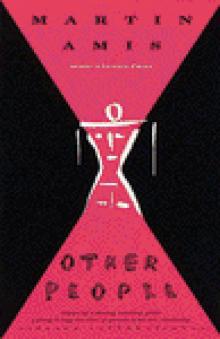 Other People
Other People The Zone of Interest
The Zone of Interest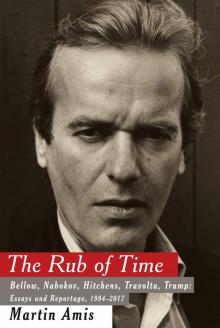 The Rub of Time: Bellow, Nabokov, Hitchens, Travolta, Trump
The Rub of Time: Bellow, Nabokov, Hitchens, Travolta, Trump Koba the Dread
Koba the Dread Success
Success London Fields
London Fields Heavy Water: And Other Stories
Heavy Water: And Other Stories Money
Money The Moronic Inferno and Other Visits to America
The Moronic Inferno and Other Visits to America Yellow Dog
Yellow Dog Time's Arrow
Time's Arrow Experience: A Memoir
Experience: A Memoir Einstein's Monsters
Einstein's Monsters The Pregnant Widow
The Pregnant Widow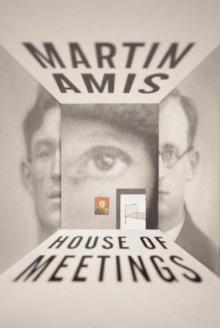 House of Meetings
House of Meetings The Information
The Information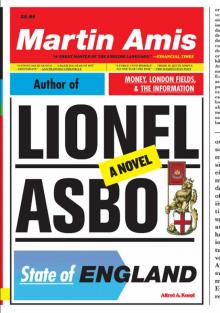 Lionel Asbo: State of England
Lionel Asbo: State of England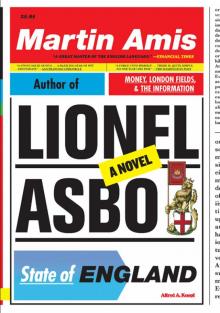 Lionel Asbo
Lionel Asbo Heavy Water and Other Stories
Heavy Water and Other Stories Night Train
Night Train Heavy Water
Heavy Water The War Against Cliche: Essays and Reviews 1971-2000 (Vintage International)
The War Against Cliche: Essays and Reviews 1971-2000 (Vintage International)